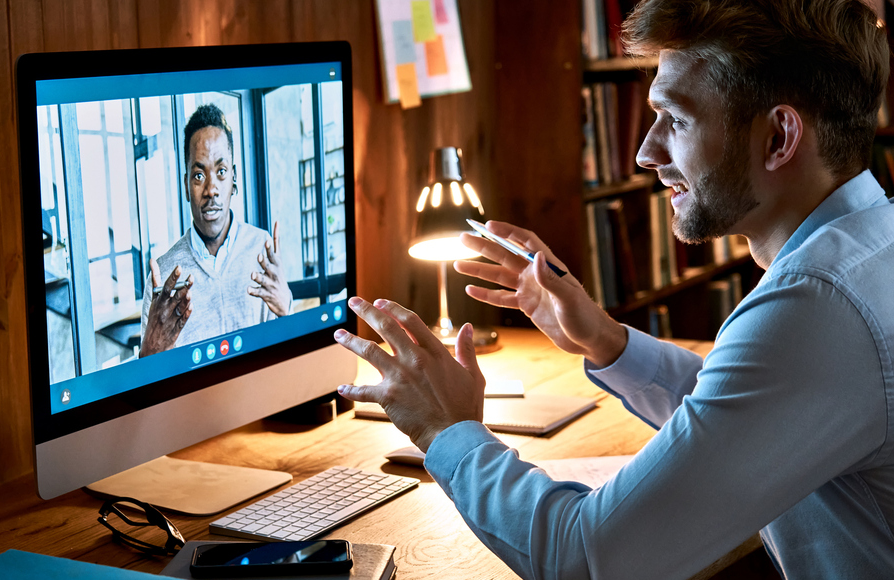Digital Interview Tips: How to prepare for a digital interview?
By Predictive Success |
8.6 min read

The corporate environments are always changing and old methods are left out to make room for the new as businesses change their tactics to make room for fresh opportunities and lure in brand new talents.Whether you’re a job recruiter or an applicant, there’s a large chance that your next interview will be conducted digitally.
Many are still new to digital interviews and find it a bit to be uncomfortable. Knowing how to prepare for a digital interview can ease the transition to this very effective recruiting tool. Here’s everything you need to know about digital interviews.
Digital Interview Questions and Answers
1. What is a digital interview?
A digital interview is one that is scheduled remotely by an employer and sent to applicants. The exact process of the digital interview depends on its type. The two most popular types of digital interviews are:
- Pre-recorded digital interview: Employers present a series of questions and invite candidates to record their responses in a pre-recorded video interview. Typically, candidates are given a minute or two to reflect before having a few minutes to respond. Candidates are free to finish their recording at any time and any location.
- Live digital interview: A live interview is the most popular style of digital interview. No matter where they are from or what time zone they are in, candidates and interviewers join into the video conference at the same time to conduct a two-way interview.
It’s pretty easy to understand why live digital interviews are a lot more popular nowadays between job recruiters as they allow the interview to go on more smoothly and create a more tailored experience to each applicant.
2. Are digital interviews harder than in-person interviews?
Unfortunately, during digital interviews, you lose a powerful tool that both recruiters and applicants benefit from: body language.
In face-to-face interviews, you can rely on facial expressions, eye contact, and other non-verbal cues to understand how the interview’s going and adjust accordingly. However, reading the room might be slightly harder when you and the other person in the interview aren’t actually in the same room!
It can be more challenging to fairly evaluate these nonverbal indications in an online interview, particularly if you or the other side are experiencing technical issues.
3. What are the advantages of digital interviews?
According to a recent survey, virtual interviews are used by 82% of companies, and 93% of employers want to keep utilizing them. Wondering why this is actually good news for both employees and employers? Here are the advantages of shifting to digital interviews:
- Removes obstacles that might face many candidates
Considering the fact that commutes to in-person interviews frequently necessitate child care for parents and possibly time off work for applicants who have jobs. It’s not surprising that 84% of businesses report increased diversity in their application pools when virtual interviewing removes obstacles like these.
- Saves time and money for both the business and its applicants
Digital interviews save candidates the expenses for transportation, tolls, parking, or, in some situations, flights and accommodations. With less expense and stress, the interview experience is a lot more effective and there are lower cancellation rates, which also saves the company the time and hassle of rescheduling appointments.
- Helps the recruitment team reach a more effective decision
To begin, with the candidate’s consent, you can share interview recordings with other decision-makers in the recruiting process. Additionally, you can examine interviews—especially useful if you’re not that good at taking notes—and even closely compare certain responses to important questions given by several candidates.
- It’s more inclusive
Another advantage of virtual interviews is that individuals with disabilities can interview from the comfort of their own home. A successful recruiting program ensures that only the top candidates are hired because they meet the job requirements and have the necessary abilities to succeed. Video interviews prevent some discriminatory biases from sweeping in when it’s time to make the decision on who really deserves the job.
Digital Interview Tips
Interviews, whether they’re digital or face-to-face, share a lot of common features. You’re going to need to prepare beforehand, practice questions, dress the part, and plan how you’ll navigate through it. Nevertheless, there are some things that you need to put in mind while preparing for a digital interview.
1. How to prepare for a digital interview?
For recruiters:
- Share clear instructions for the interview — Once you’ve informed your candidates that their interviews will take place via videoconference, get in touch with them and go through the specifics of their meetings, how to use the video conferencing system, and whether any software downloads are necessary.
- Create a backup plan — Even after all your planning, technology can occasionally let you down on the day of the interview. It’s wise to give candidates a backup phone number to call if there is a problem or the technology fails as an extra measure of safety and ask them to do the same as well
For applicants:
- Practice beforehand — Remember that interviews conducted through video are almost usually scripted. Like everyone else who is applying for the job, you are responding to the same questions in the same sequence. Candidate control is another benefit of video interviews. You don’t need to anticipate or plan for curveballs or bad inquiries. Video interviews aim to evaluate your chances of success based on merit, not prejudice. What does this mean for you then? It means that practicing interview questions is more important than ever!
- Don’t look at your reflection too much — Eye contact is a really important tool when it comes to digital interviews as it’s basically the only sign of body language that an interviewer can read through his screen. You can engage in a more natural and interesting dialogue with your interviewer by disabling video mirroring as most candidates find it distracting.
For both:
- Treat it as if it was a face-to-face interview — It’s crucial to let the other person know that the following video interview is just as significant and serious as an in-person interview would be. So, present your best self while dressing accordingly. Make sure your phone’s ringtone and the notifications for your email and social media accounts are both off.
- Give your technology a test run — Make sure your signal is strong enough, and that your camera and microphone are set up so that the other person can see you and hear you easily. If you intend to share your screen or add a video background, practice using the function before the actual interview to ensure that you can use it with ease.
2. What to ask in a digital interview?
The foundations of interviewing remain consistent regardless of format. Employers must have the capacity to quickly restrict the candidate pool while making educated decisions. However, while businesses are aiming to hire talent that fits with their business plan, it is still difficult to learn about a candidate’s character and values through a digital interview and determine whether they fit with the company’s culture or not.
It may appear difficult, yet it is doable if recruiters use the Head, Heart, and Briefcase structure. Here’s how:
- Head:
The individual’s motivations and behaviors make up the Head portion of the framework. It offers an unbiased perspective on the person and shows whether they possess the soft skills and emotional intelligence necessary to successfully adjust to the demands of their job and the work environment. Ask questions to determine how well the applicant meets the behavioral standards of the role. For instance:
- What have your prior professional experiences taught you about your own communication style?
- Can you give an example of a moment when you had to handle conflict? How did you solve the issue?
- Tell me about a time you saw a project through to completion. What strategy did you implement?
- What do your coworkers consider to be the best aspect of working with you
- Heart:
The values & culture that a person holds inside themselves make up the Heart component of the framework. The heart is where the beliefs, principles, morality, work ethic, and “why?” reside. The results of the assessment can be used to pinpoint areas that need further investigation in order to ascertain whether a person’s beliefs and culture match those required by their role. Here are a couple of interview questions that can be used to assess this portion of the framework:
- What does a perfect workplace culture mean to you?
- What traits and principles enable you to perform at your highest level at work?
- Tell me about your professional goals.
- What qualities do you think makes a great manager/teammate?
- Why did you choose this job?
- What drew you to our company?
- What or who has motivated you in your professional life?
- Briefcase:
When it comes to evaluating a candidate, the briefcase is usually what gets the most attention. The briefcase includes previous education, training, credentials, and experience so it’s basically what every candidate has already included in his resume or LinkedIn profile. This is frequently the primary criterion for hiring, however, it has been shown to be a poor indicator of success when it’s used on its own to assess candidates. Some common questions for assessing this component are:
- What do you think stands out more than the rest in your professional background so far?
- How familiar are you with the tools that our team employs on a daily basis?
- Have your previous work experiences pointed out any weaknesses that you might have? How have you worked on improving that?
- What skills have you developed through your past positions that will be helpful in this job?
Knowing how to conduct a digital interview has quickly become an essential skill every recruiter needs to have. Both candidates and companies might profit greatly from choosing a digital interview.
Interviews can be screened and reviewed more quickly by hiring teams, improving interview efficiency, and expanding the pool of talents they’re hiring from. Candidates have the choice to participate in a digital interview from the convenience of their home or place of employment.
While digital interviews will take some time to get used to, from both candidates and recruiters, it’s still worth the while!
Related Blogs
Top 20 Questions to Ask your Boss
Top 20 Questions to Ask Your Boss—Backed by The Predictive Index Whether you're stepping into a new role, joining a fresh team, or just aiming to build a stronger relationship with your current
What Are Leadership Best Practices?
Leadership Best Practices Relating to The Predictive Index: Insights from Predictive Success Effective leadership is the bedrock of any successful organization. Leaders are the visionaries who guide their teams, the decision-makers who drive change, and
What Is The Meaning of Emotional Capacity & How to Best Build It?
What Is the Meaning of Emotional Capacity & How to Best Build It? Emotional capacity is the ability to manage emotions effectively, understand the emotions of others, and remain resilient in the face of stress


